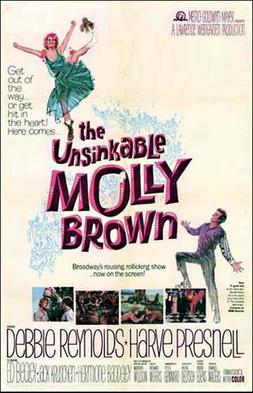Critical reception
A.H. Weiler of The New York Times called the film "big, brassy, bold and freewheeling" but added, "The tones are ringing, but often hollow. Molly is a colorful character all right, and the screen, which is as wide as can be, is filled with vivid colors that help project the fact that this is merely a satisfying musical comedy and not an inspired subject." He continued, "This is not to say that Meredith Willson's score is not tuneful and lilting but to this listener it is good, sweet corn that is more palatable than memorable. Mr. Gennaro, on the other hand, has devised dances that more than complement Mr. Willson's music. They may seem to be improvised but they have the true marks of professionalism in their carefully plotted verve, bounce and exuberance." He concluded, "The Unsinkable Molly Brown, in the person of Miss Reynolds, and the other principals, often mistakes vigor for art. But Metro's lavish and attractive production numbers make up for this basic superficiality. For all of its shallowness, Molly is a cheerful and entertaining addition to the local screen scene." [9]
Variety observed, "In essence, it's a pretty shallow story since the title character, when you get right down to it, is obsessed with a very superficial, egotistical problem beneath her generous, razzmatazz facade. On top of that, Willson's score is rather undistinguished. Debbie Reynolds thrusts herself into the role with an enormous amount of verve and vigor. At times her approach to the character seems more athletic than artful. Harve Presnell ... makes a generally auspicious screen debut as the patient Johnny. His fine, booming voice and physical stature make him a valuable commodity for Hollywood." [10]
Channel 4 called it an "amiable comedy with a handful of good tunes" that "lacks the satirical bite which its story may suggest. Sometimes the director seems to feel more at ease with the melodramatic moments than the comedy ones." [11]
Time Out London noted, "As ebulliently energetic as ever, Reynolds makes the brash social climbing both funny and touching, but the film itself gets trapped in two minds between satire and sentimentality. The score ... though pleasant, is rather thinly spread; but the sets are a delight in the best traditions of the MGM musical, and Walters does a wonderfully graceful job of direction". [12]
TV Guide rated the film three out of four stars and commented, "A rambunctious and spirited effort from Reynolds ... saves this otherwise weakly scripted, familiar musical from the long list of forgotten pictures." [8]
